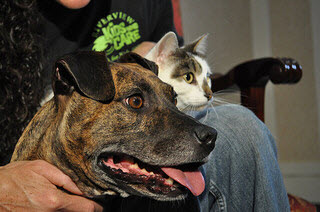
Acetaminophen, also known as paracetamol in some countries, is a common over the counter medication which is very effective in people to relieve pain and fever. However, it is extremely dangerous for your dog.
Most dogs become poisoned with acetaminophen when he is unwell, and an owner decides to treat him without veterinary advice. Less commonly, a dog may eat spilled tablets or capsules.
In dogs, a dose of approximately 100mg per kilo bodyweight will lead to illness. Apart from causing liver damage, acetaminophen also damages and destroys red blood cells, and affects their oxygen carrying capacity. Red blood cells contain hemoglobin which holds onto oxygen molecules and transports them through the body. Acetaminophen converts the hemoglobin to methemoglobin, which is muddy brown in color and unable to carry oxygen. This reverses naturally so hemoglobin levels will return to normal.
Dog Poison Symptoms
Signs of poisoning in your dog start to develop around 36 hours after being given the drug. Your dog may vomit, and will become very depressed with a very sore abdomen. These signs are due to liver damage. In addition, your dog will have brown colored gums (due to the methemoglobin in the blood), and may pant and have a rapid heart rate as it tries desperately to increase the amount of oxygen in his blood, and move it quickly around his body. Mild cases of acetaminophen poisoning may recover in a few days with veterinary treatment, but severe cases progress to jaundice (yellowing of the gums due to liver failure) and death usually within a week.
Dog Treatments
Treatment by a vet is essential if your dog is to have any chance of surviving. If your dog has eaten the acetaminophen in the past few hours, your vet can give a medication that will make your dog vomit and hopefully stop any more drug being absorbed. Your dog will also need to go on a drip, and may need a blood transfusion or oxygen by nasal tube to improve oxygen supply to the body. It can take some time for your dog to recover, and if it does, he may be left with long term liver damage.
Prevention
Preventing accidental poisoning with acetaminophen shouldn't be too hard. All medications should be kept out of reach of children, and thus dogs shouldn't be able to get their paws on them. Never treat your dog's illness yourself with acetaminophen and you'll not have a problem
FREE 7 Veterinarian Tips For Dog Health Care ($27 value) for a limited time ==> [http://doghealthcare.biz] dog health forum and dedicates a blog about dog health care [http://doghealthcare.biz]
For more infomacio Click Here!

No hay comentarios:
Publicar un comentario